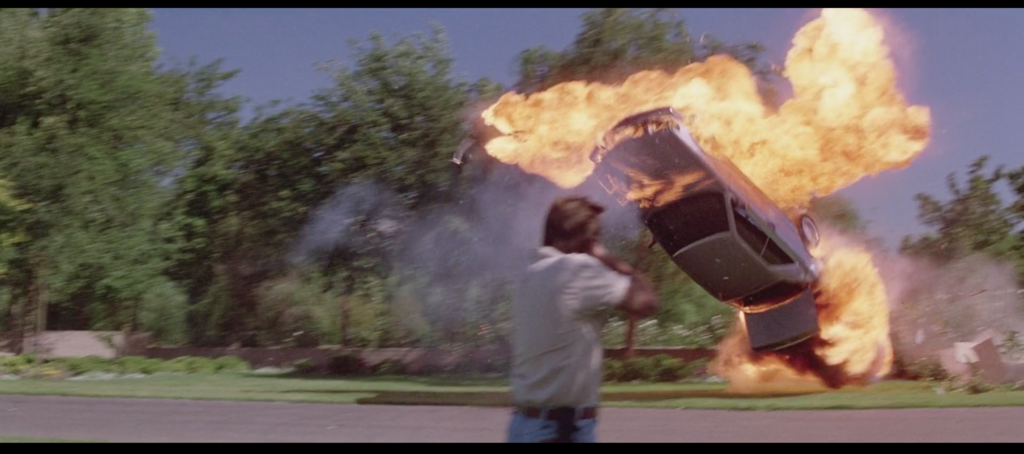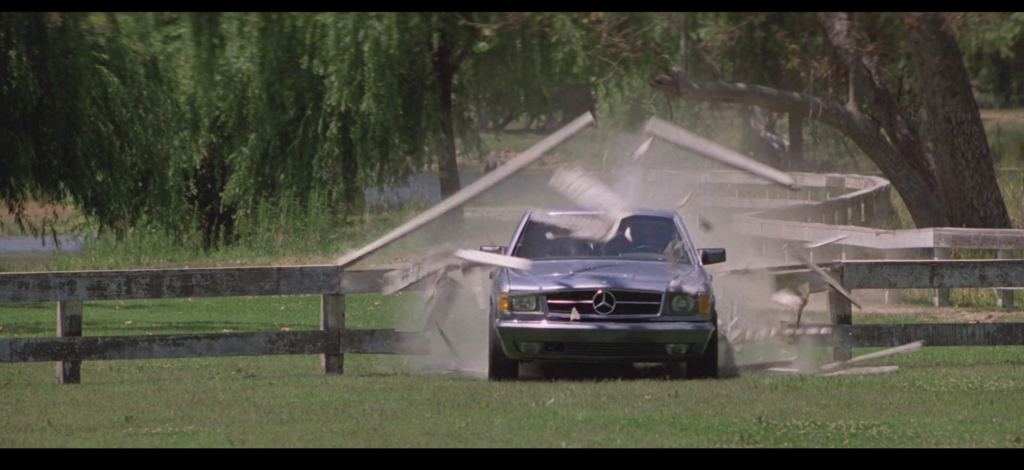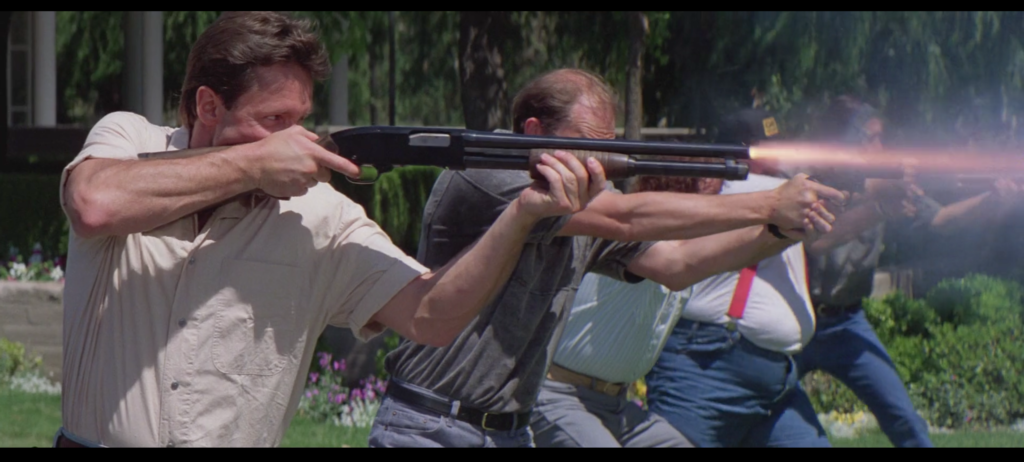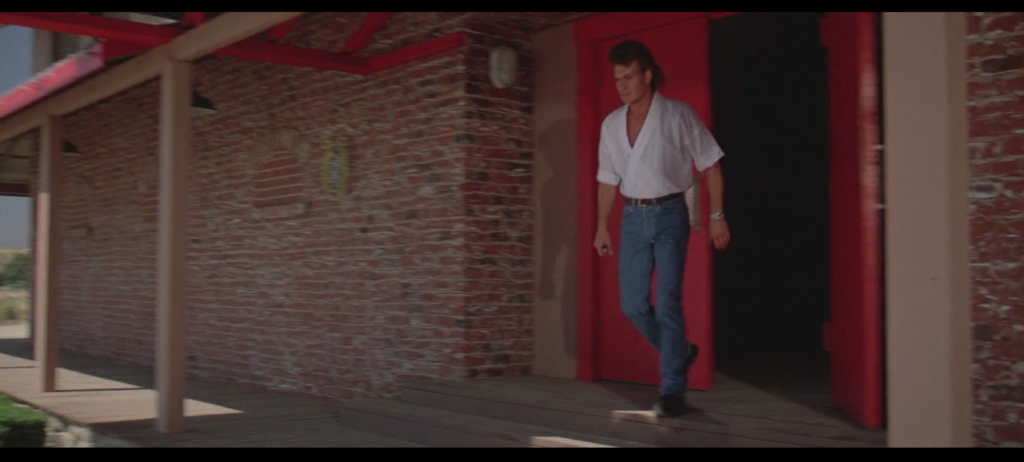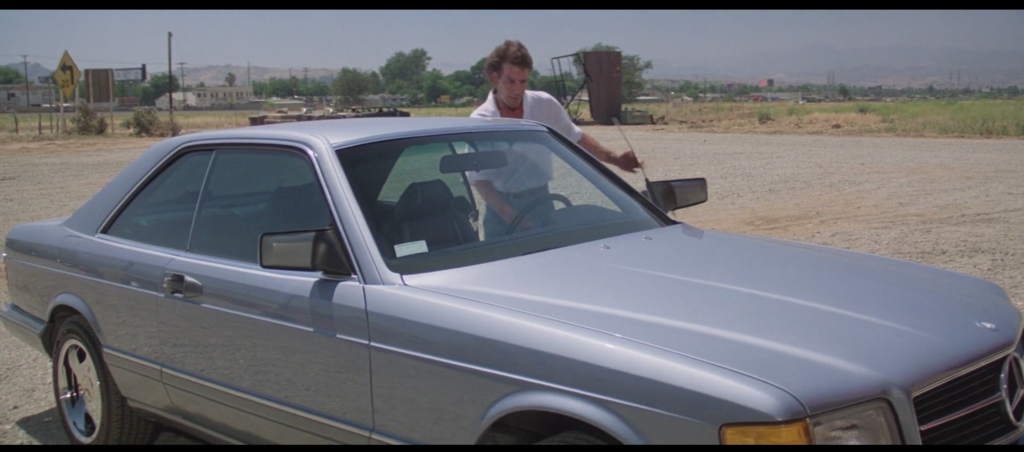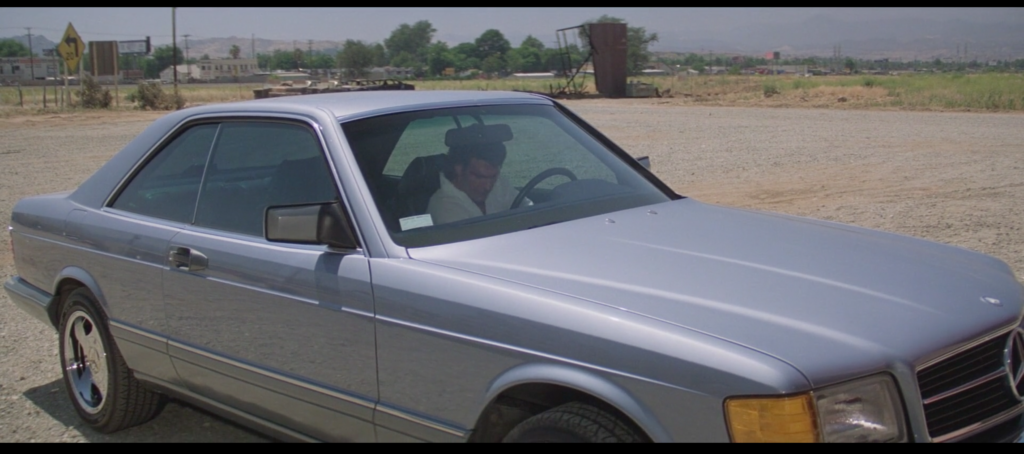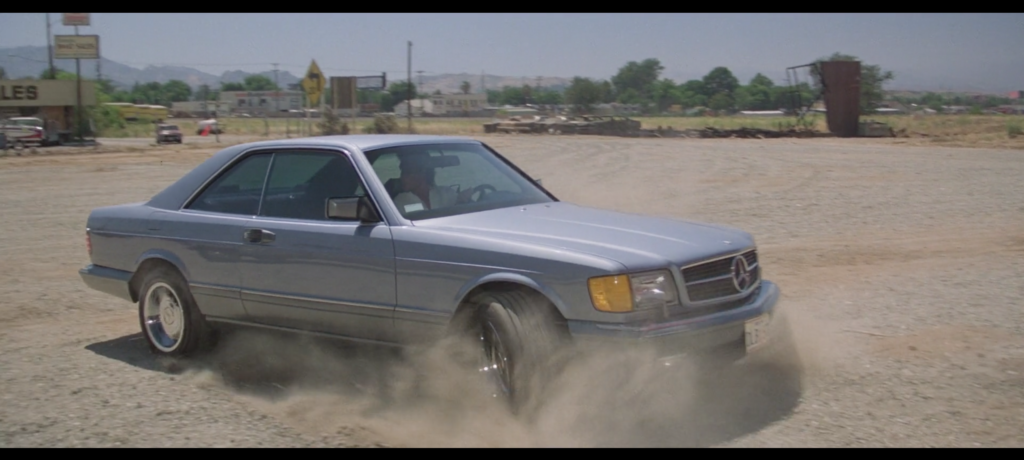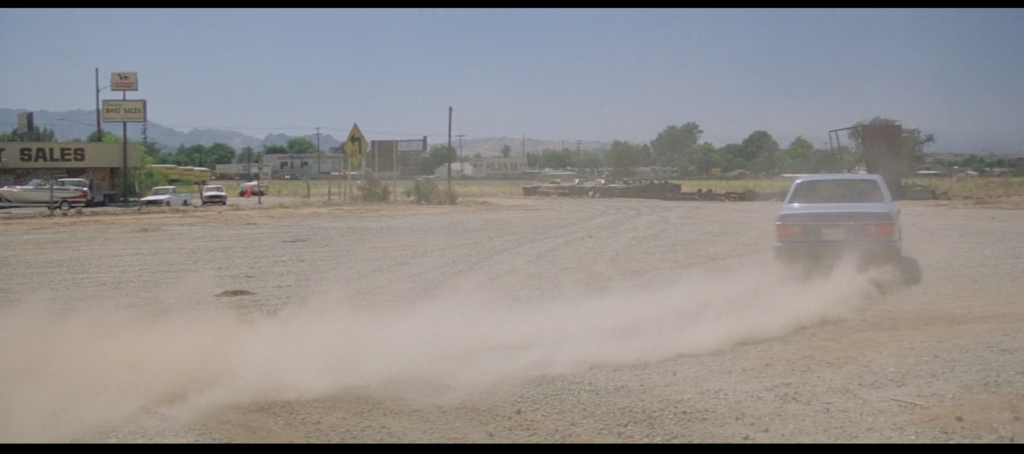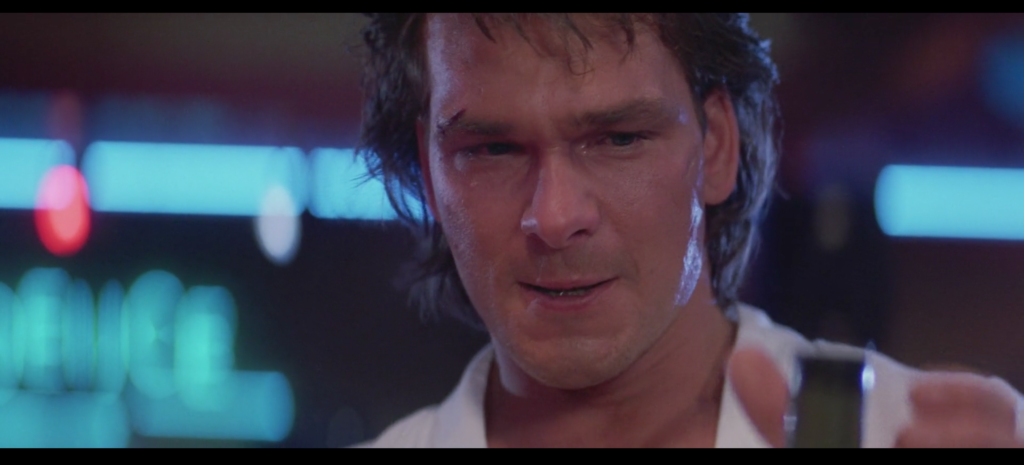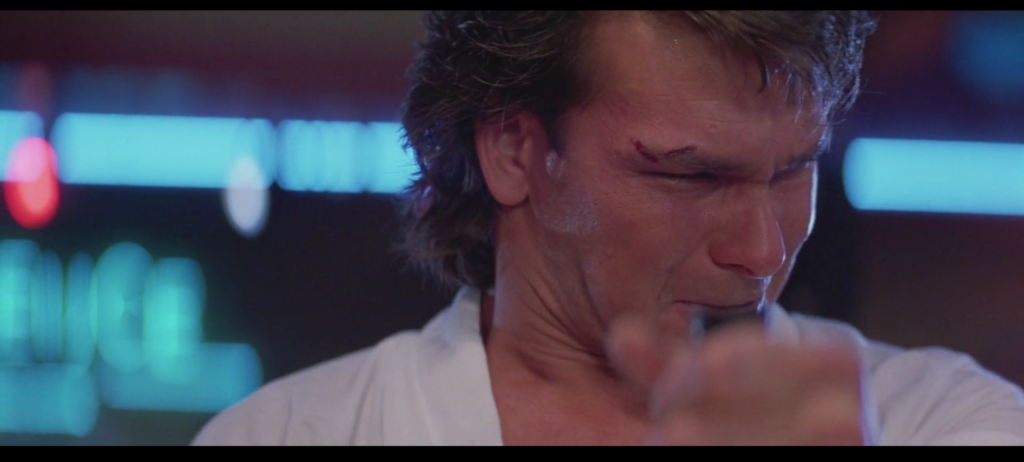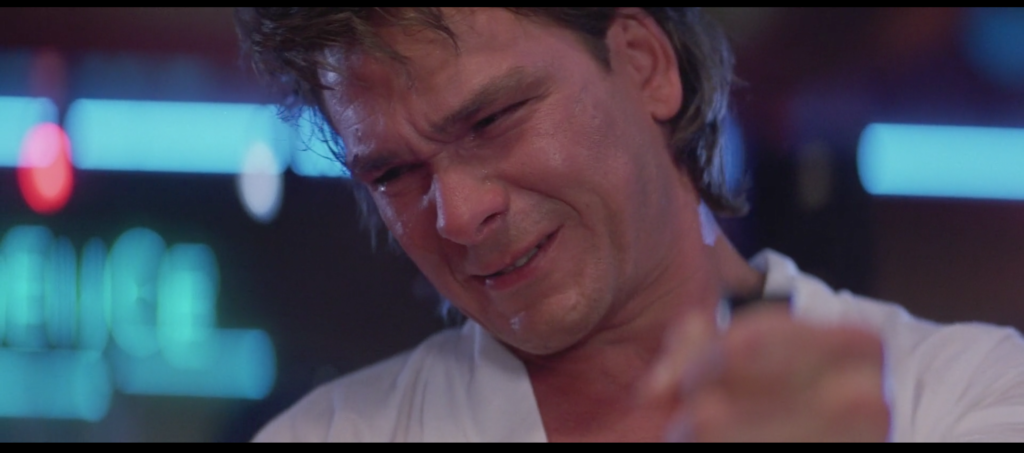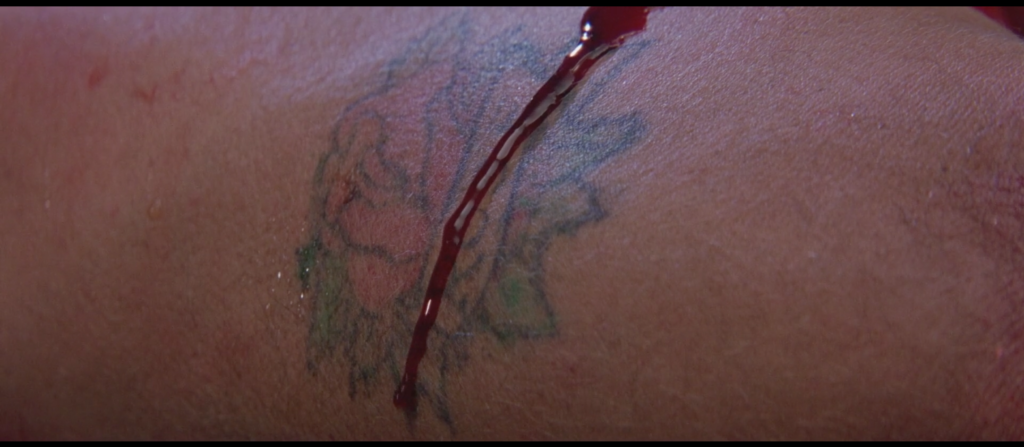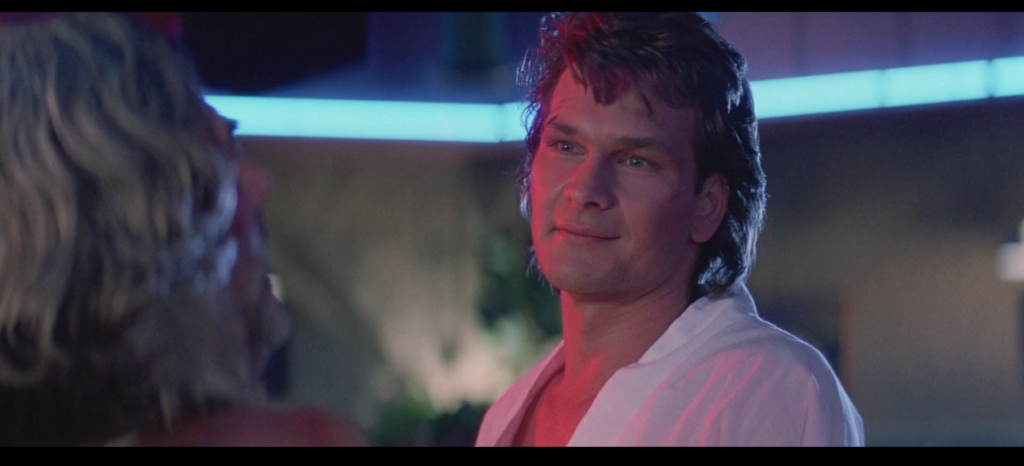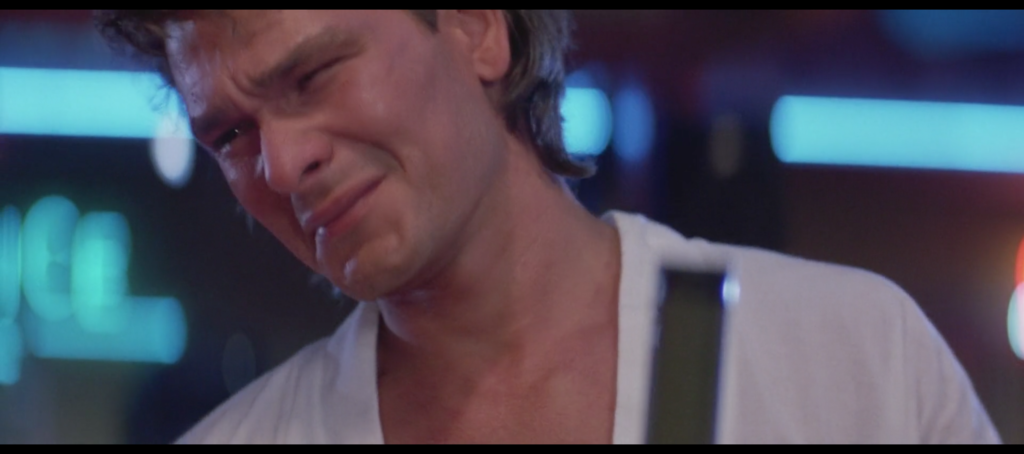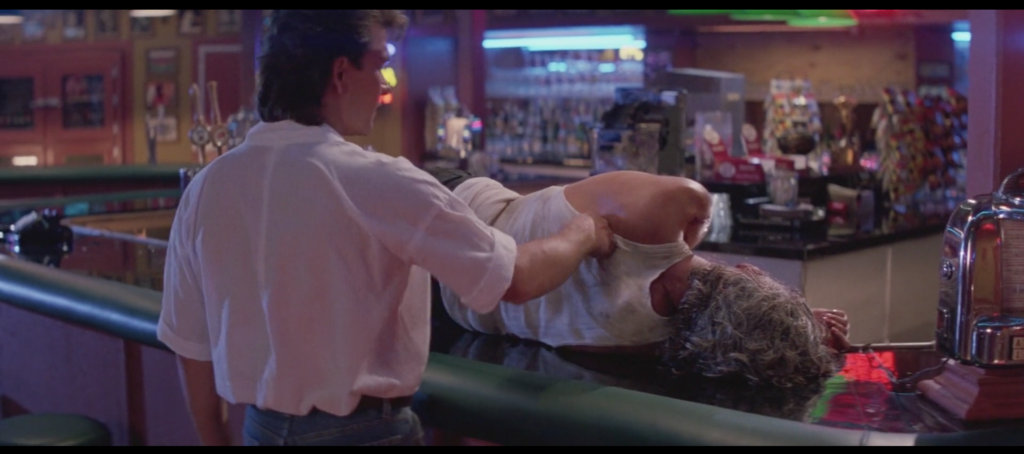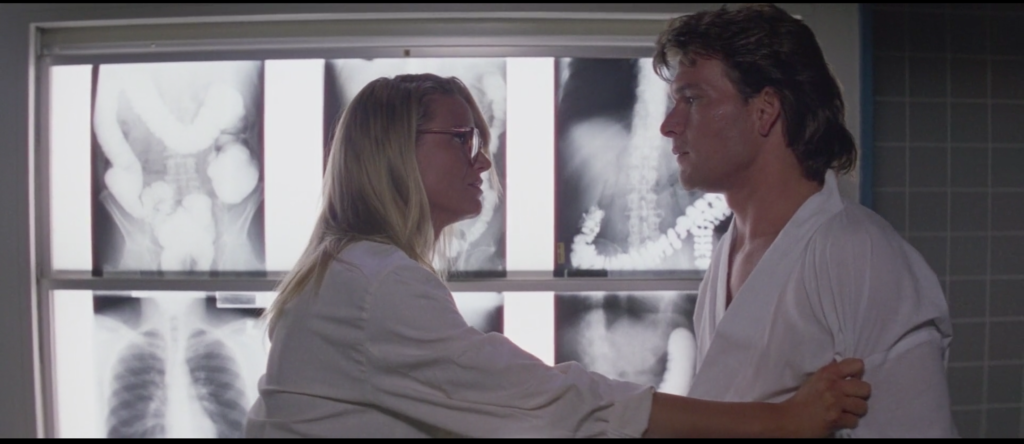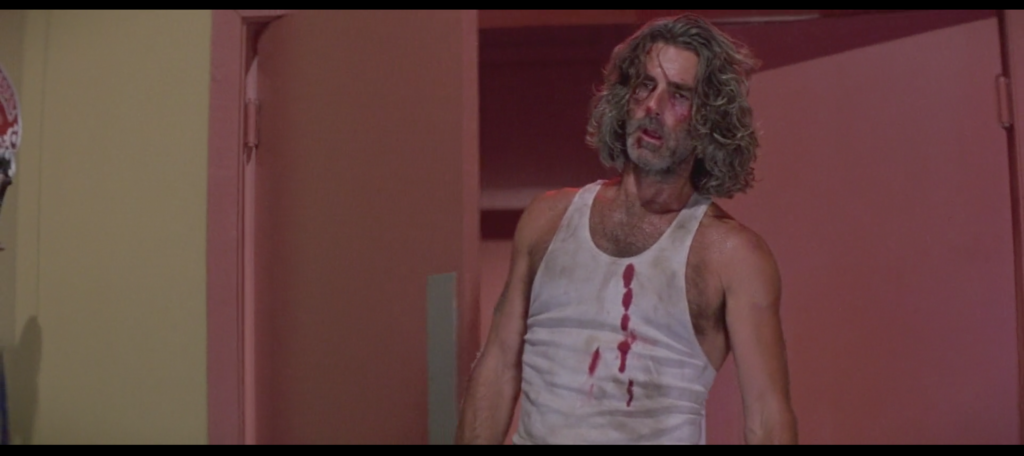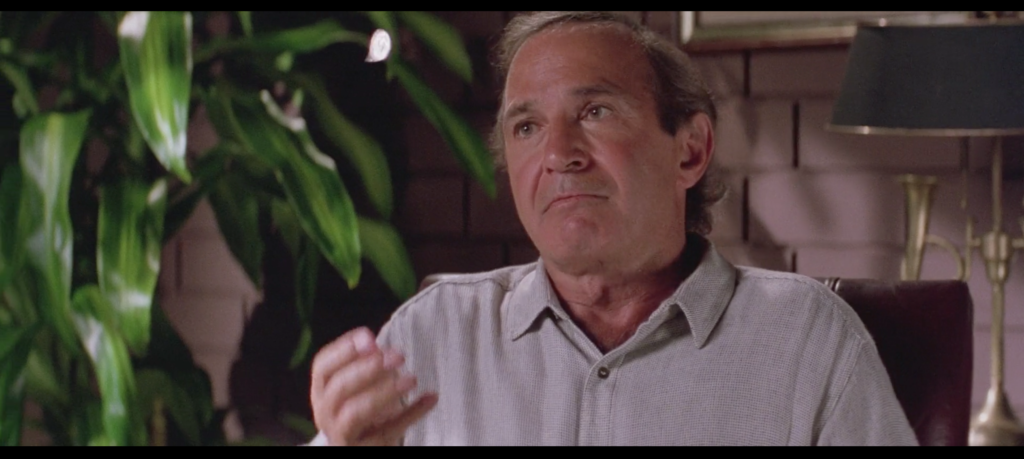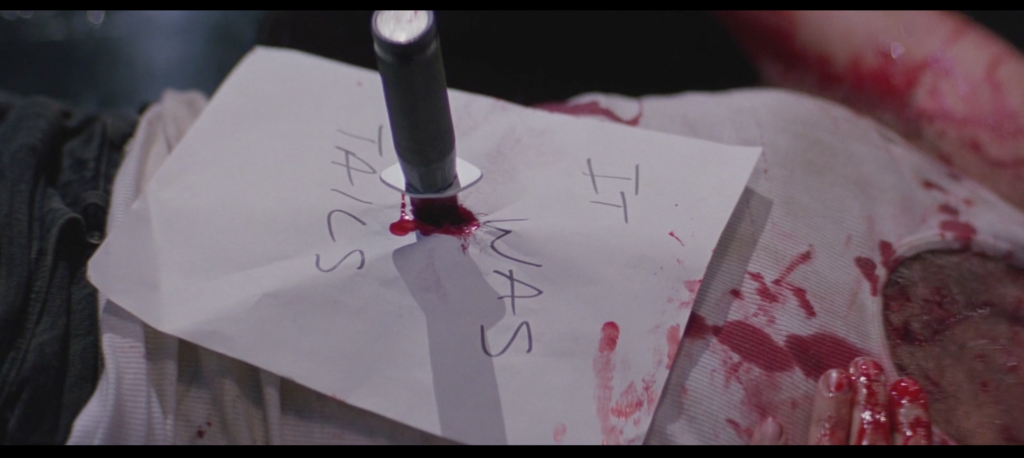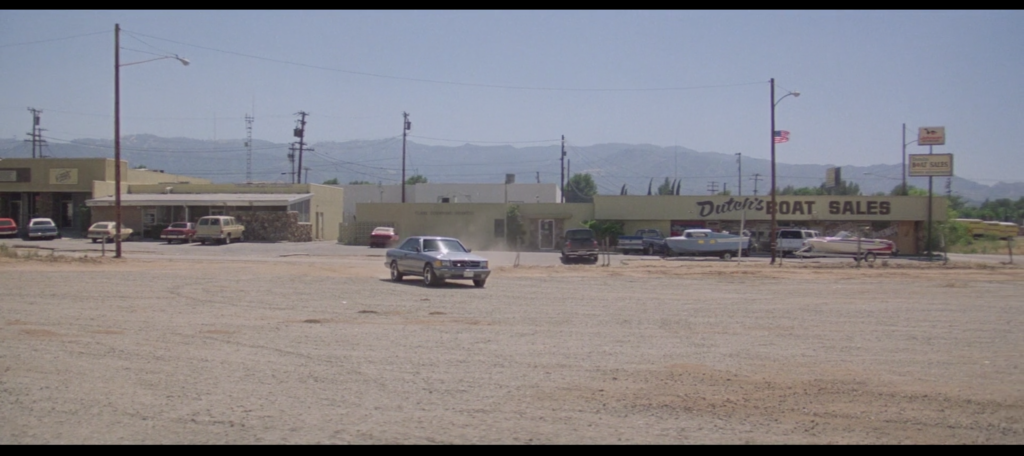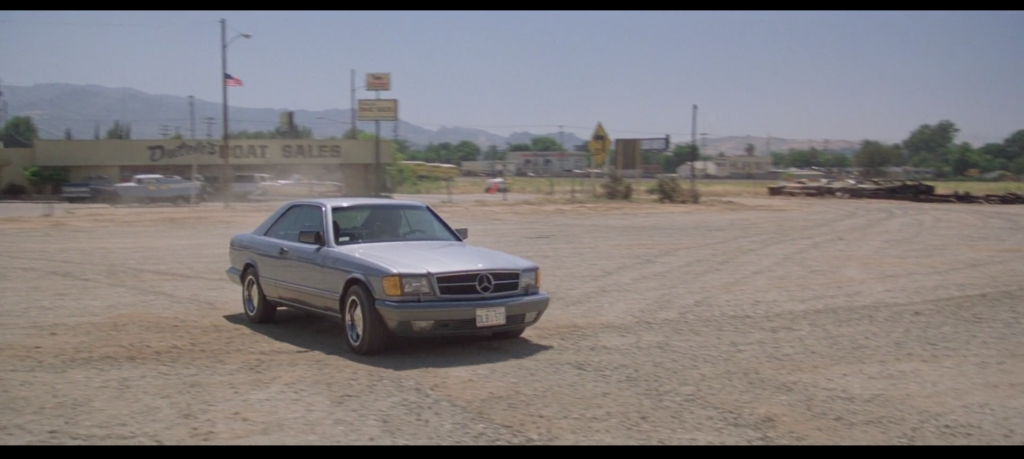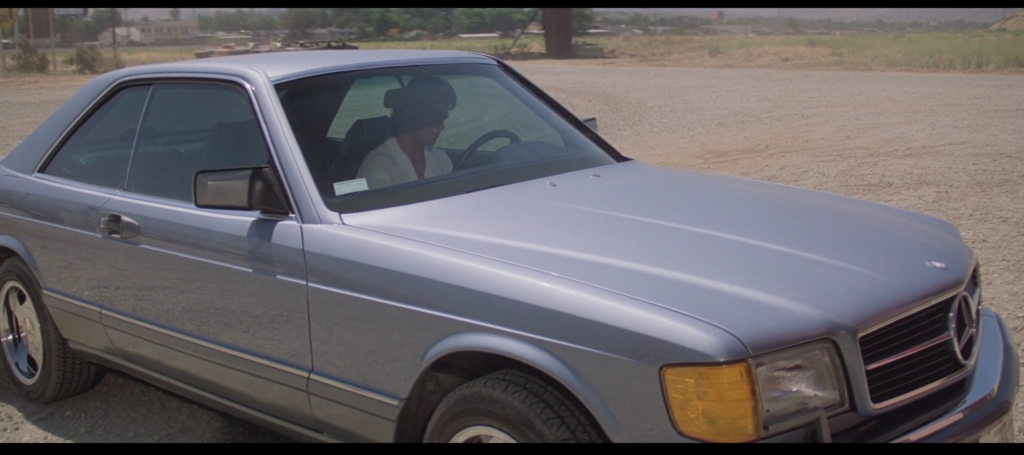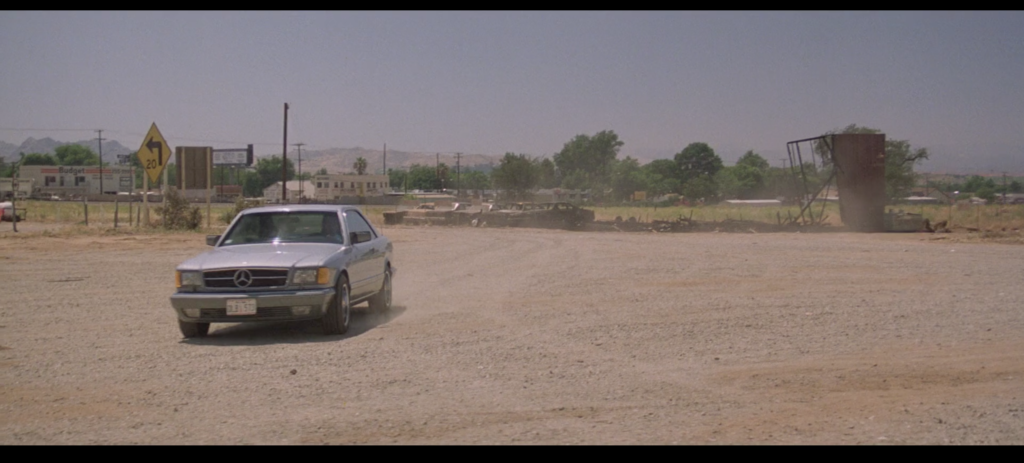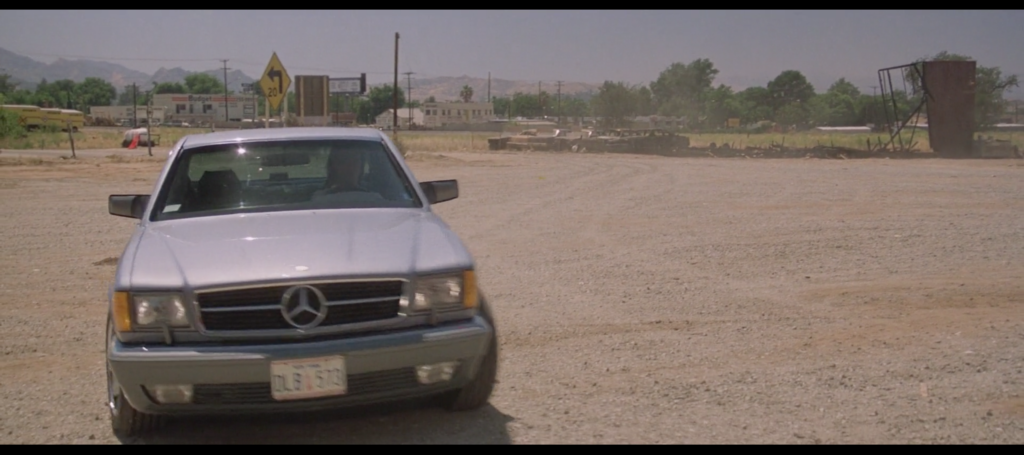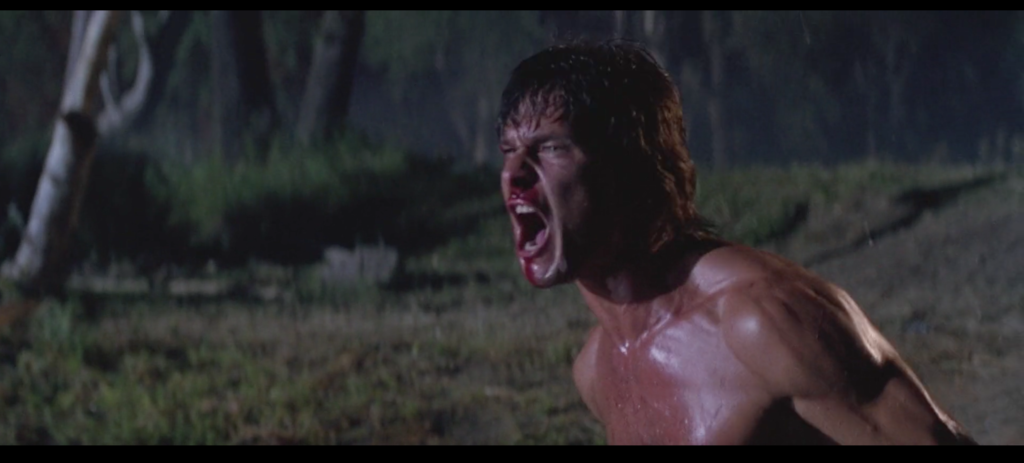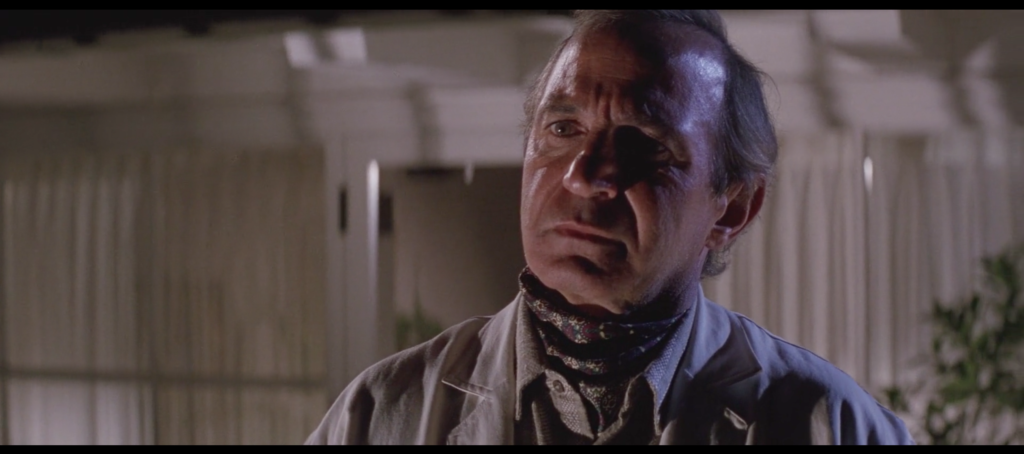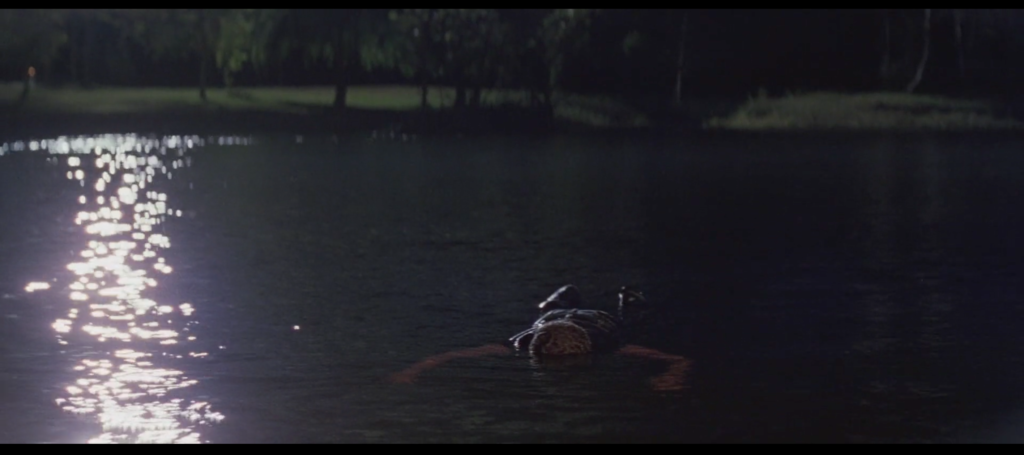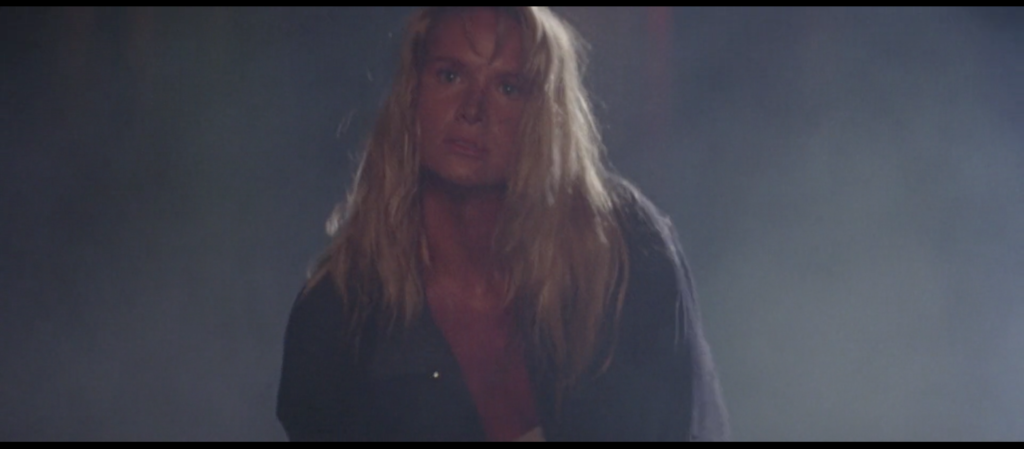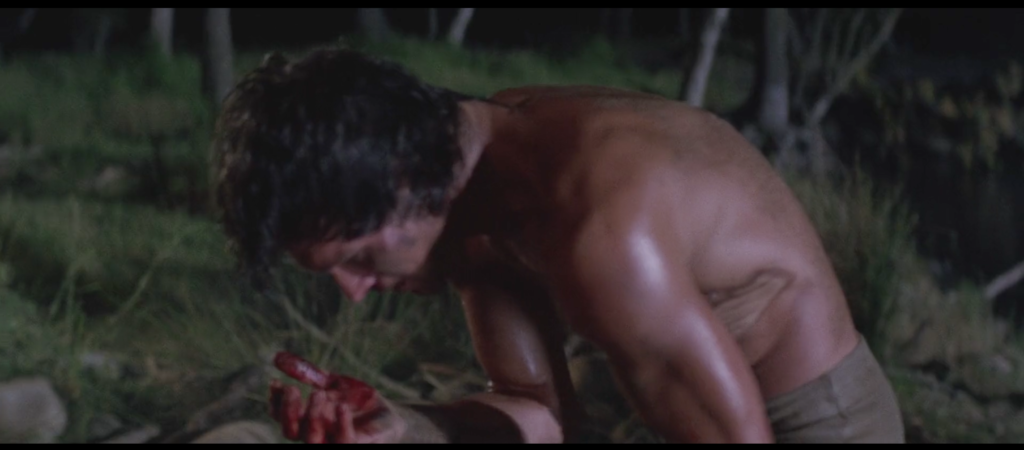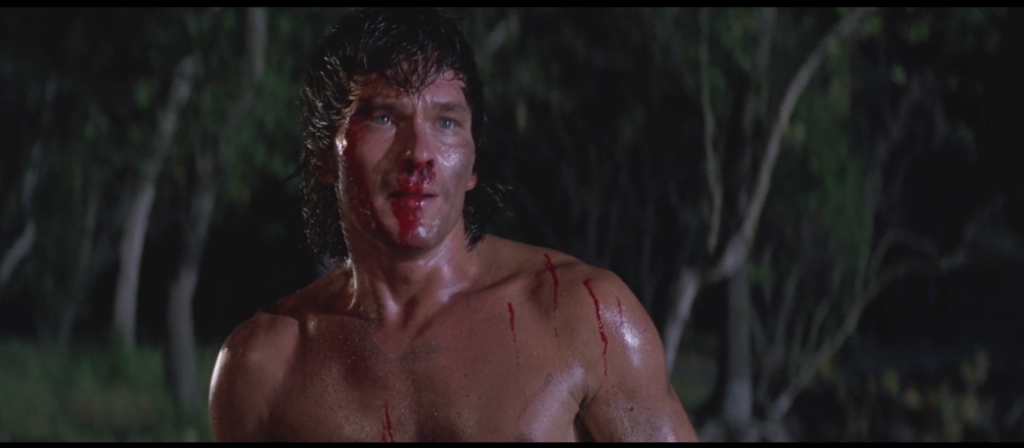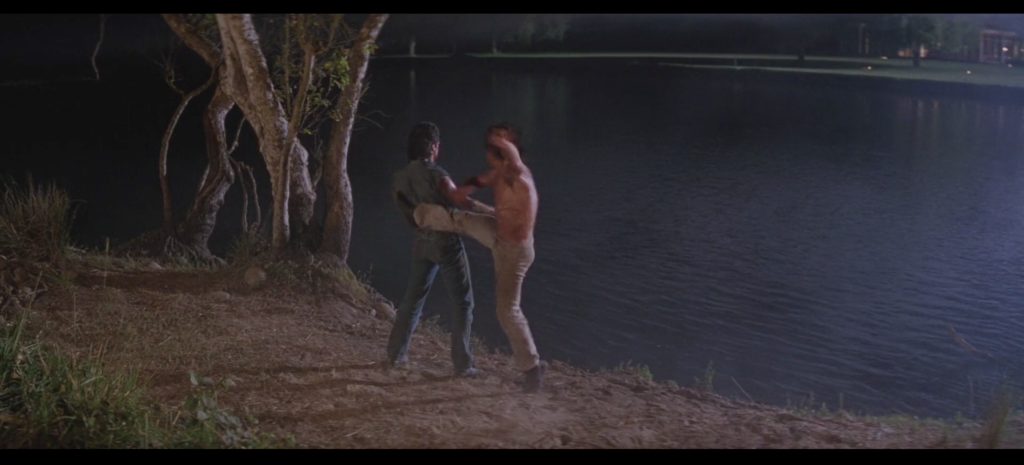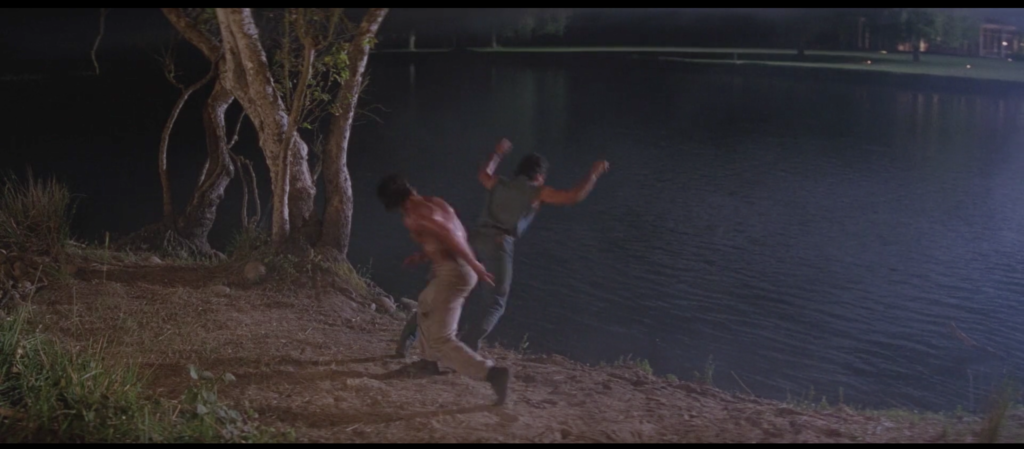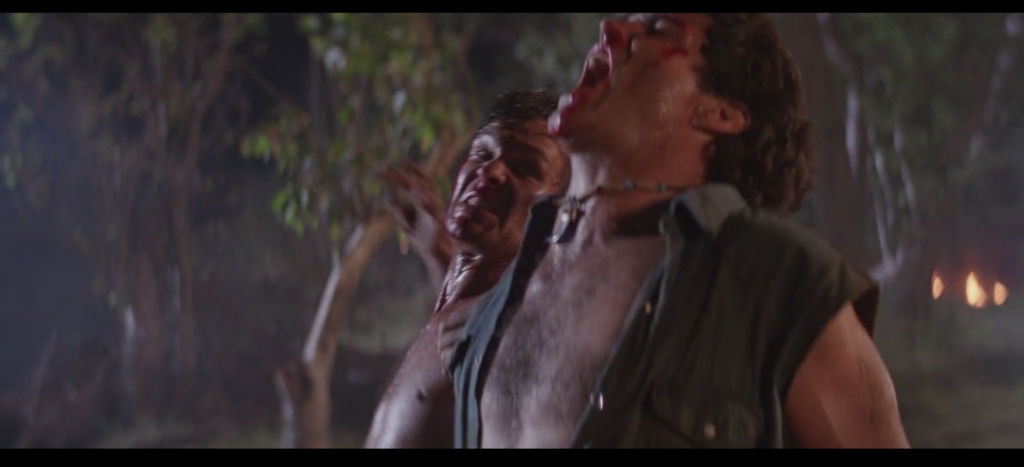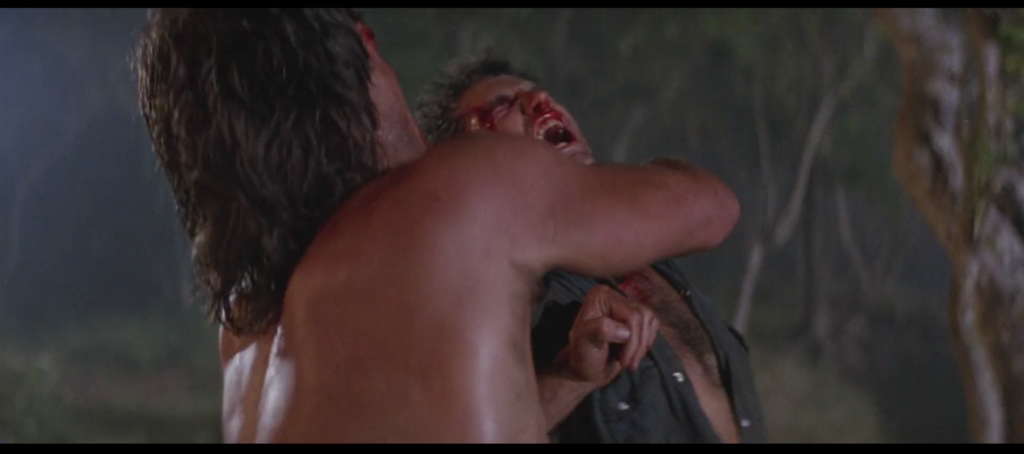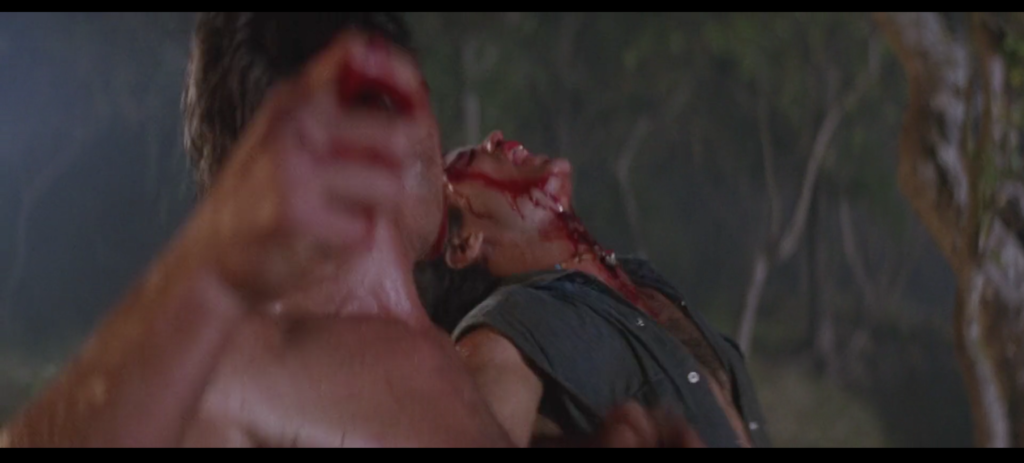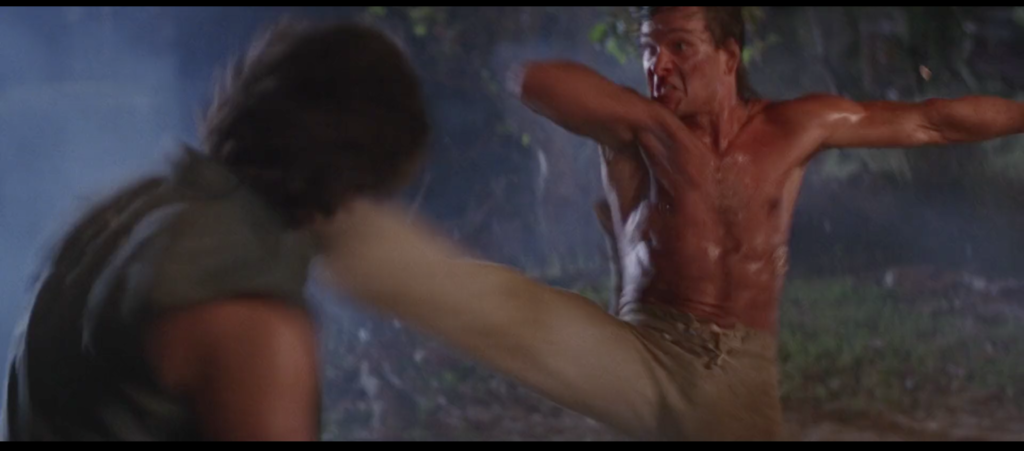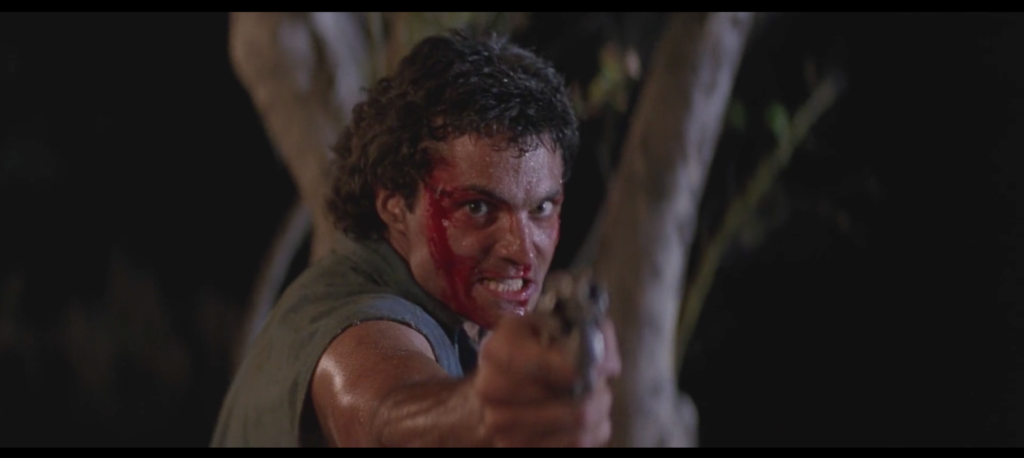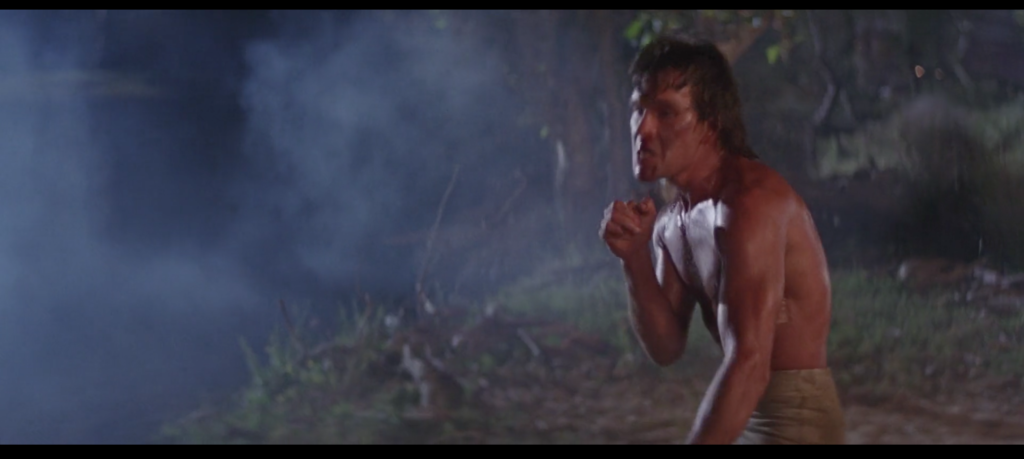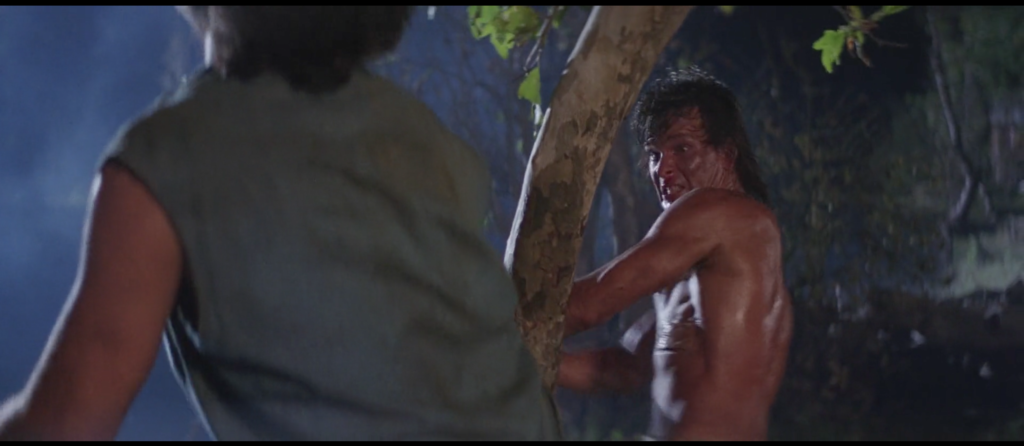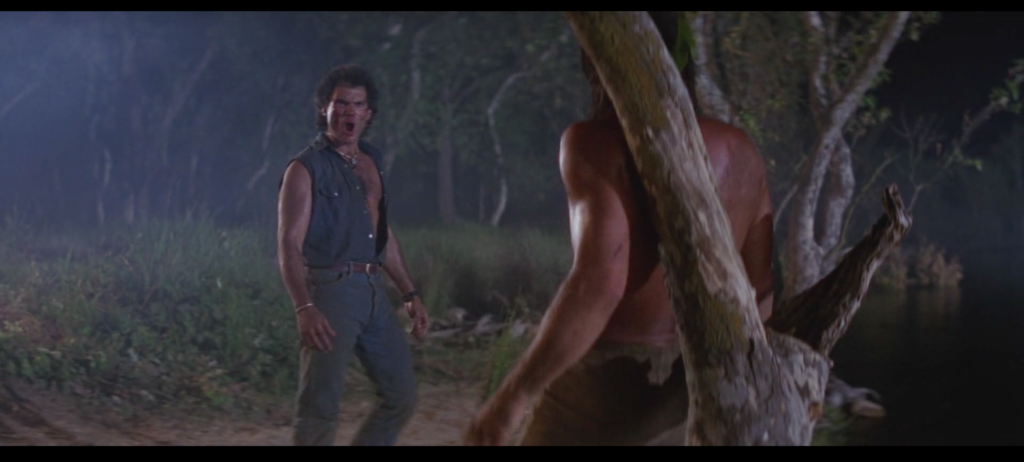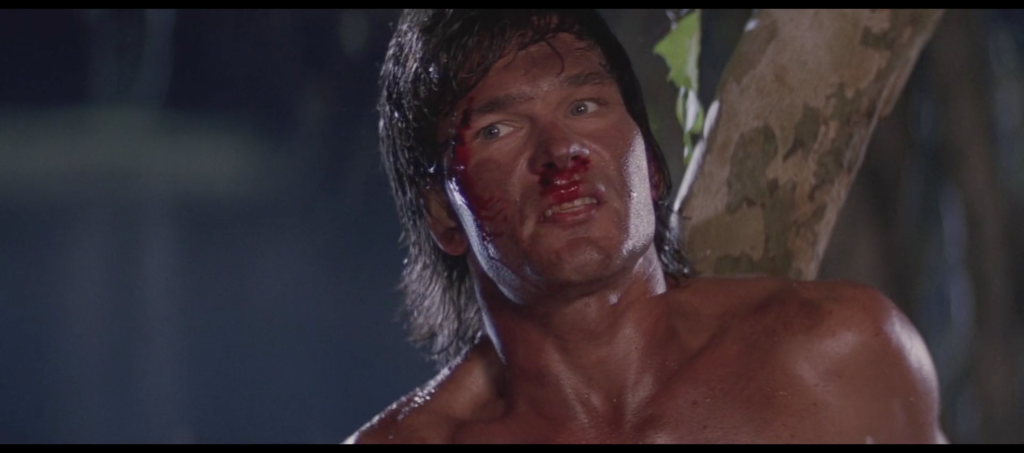Posts Tagged ‘dalton’
329. Death of the dream
November 25, 2019Dalton’s Mercedes-Benz represents the freedom afforded him by his life as North America’s second-best bouncer. It is the only ostentatious display of his considerable wealth. It is the vehicle he uses to travel from one town to the next, never tied down. It is the secret self he hides from his employers and antagonists alike, safe in a garage or under a tarp as his latest hoopty serves as its whipping boy.
So it means something when Dalton jams a knife through the gas pedal, pinning it to the floor, and lets the car loose in the goons’ general direction. It means something when it hits some kind of natural earth ramp and leaps above a low brick fence into the air, sustaining fire all the way. It means something when it detonates and bursts into huge gouts of flame, an explosion that means as much to Dalton’s lifestyle as the explosion of Red’s Auto Parts meant to Red Webster or Emmett’s house meant to Emmett.
Dalton’s way of doing things is over, it’s finished. It died with his car, consumed by its flames. The only question now is what will rise from the ashes.
327. Goons vs. Car
November 23, 2019After three star turns in under five minutes, Dalton’s car finally has its first fight scene. First and last, sad to say. It barrels towards Brad Wesley’s mansion at breakneck speed, plowing right through a fence and over a hedge to its appointment with destiny. Arrayed against it are Wesley’s five core goons who are a) alive and b) not Karpis—Ketchum, O’Connor the Bleeder, Morgan, Tinker, and Pat McGurn. There’s no jaw-jacking involved here. It’s on sight. They open fire with an array of shotguns and handguns—all of which raise the question of why they bothered with the fistfighting and knife-fighting in the first place. They certainly don’t hesitate to shoot Dalton’s Benz, and (they assume) Dalton himself, full of lead. Was it Jimmy’s death that lifted the shibboleth against straight-up murder by gunfire? Did Dalton bring this fusillade upon himself? Or at the very least on his car?
326. And now: Un-Parking
November 22, 2019I know what you’re thinking. “We’ve already seen Dalton park his car in the same spot twice in three minutes. Do we really need to see him leave that parking space, too? Do we need three instances of him pulling into or pulling out of a parking spot in five minutes total?” Define need, I suppose is the best response here. For one reason or another Road House decided it is of paramount importance that we see Dalton getting into and out of this car over and over and over again. There’s at least one storytelling reason for this that makes some kind of sense, as you’ll soon see. I’m not sure if there’s really sense to be made, but I’m open to the possibility. I’m even open to the idea that it’s the film’s way of showing how even in the face of danger and tragedy, the drudgery of everyday life continues. If you’re off to avenge the death of your mentor at the hands of the minions of a berserk Chamber of Commerce luminary, guess what? You’ve still gotta drive there.
325. Rose
November 21, 2019The idea comes to him fast, and he acts on it just as suddenly. There’s a knife sticking out of the chest of his mentor and best friend. The knife has to come out at some point. Perhaps it’s best, perhaps it’s right, that he remove the knife himself, that he wield that knife against the perpetrators of this horrible crime. So he steels himself. He breathes deep and exhales through his closed lips. He puts his hand on the hilt. He shifts his gaze from the knife to the face of his slain friend and back again. All the while he grips and pulls, pulls, pulls. The camera cuts away as if to spare us the intimate sight of Dalton pulling the penetrator out of the body of Wade Garrett, the most famous bouncer in all of Christendom, the man who made him the man he is today. All we see is the thin trickle of blood that flows over Wade Garrett’s rose tattoo. In interviews it is canon-established that Rose was the name of the woman who gave him his favorite scar, on his hip, inches from his pubis. A permanent tribute to the glory of sex, stained in this final hour by the plain fact of violence. This is the end of the road for Wade Garrett, but the knife that pierced him will plunge into another body before the day is done. To Dalton, that much is clear.
323. Sublime/Faces of Death Redux
November 19, 2019I sometimes think of Road House as a sublime movie, and that’s not an adjective I throw around for movies that often. For me it’s reserved for films that transport me into a place of tangible, physical awe—the equivalent of musical frisson, that chill you get up and down your spine and through your skull from art that stuns you. If you know me at all it won’t surprise you to learn that I get this feeling most often from horror films. I think Jaws is sublime. I think The Exorcist is sublime. I think The Shining is sublime. I think Aliens is sublime. I think Hereditary is sublime. I think Barton Fink is sublime. You get the idea. So you get that Road House does not transport me the way any of those movies do.
Why is Road House sublime? Because sandwiched in between two identical parking scenes and a scene in which two lovers confront one another over matters of life and death in front of a bunch of x-rays of people’s colons, Patrick Swayze looks at Sam Elliot like he does above and below. First: total love, respect, humility—he is admitting he was wrong after all—and above all gratitude that he gets to know this man. Then: total loss, grief, anger, denial, anything but acceptance that this man who meant so much to him is gone.
The word I use to describe Patrick Swayze as an actor is generous. He gave himself over to this absurd role in this absurd film, used every ounce of his training as an actor and a professional-grade stuntman and a professional-grade ballet dancer. Every interview I’ve ever seen with Kelly Lynch or Marshall Teague or Sam Elliott in which they’re asked about this film is full of superlatives of how dedicated he was, and how kind he was, and how the experience of working with him was…well, they don’t say it, but I will: sublime.
Parking, acting, colons, parking, more acting, acting like his life has fallen apart, like the person he loves most in the world has been stolen from him. His eyes squint with tears and she shakes his head wildly back and forth, moving his whole upper body at one point, his whole self one gigantic No. Some of the dumbest filmmaking I’ve ever seen, and then this. Sublime.
322. “Yo! Wake the fuck up!”
November 18, 2019“Sit the fuck down, have a beer, I’ll be back,” Dalton said to Wade just before departing to find Elizabeth. “Wesley wins, man. We’re outta here.” It’s then that Wade shoots him the “Attaboy, mijo” he will no doubt return to in his mind for years, even decades, to come. They’re just two men being men, swearing when it isn’t necessary, patting each other on the back. It’s who they are, even when one of them has been beaten half to death.
Dalton attempts to return to this pattern of dialogue when he comes back to the Double Deuce after his failure with the Doc. “Yo! Wake the fuck up! We’re outta here!” he says from across the room, smiling. This has alway struck me as the one genuinely superfluous f-bomb in the whole profane film. “Wake the fuck up” right away, without even a normal “wake up” first? It feels forced.
And it probably is. After all, in the guise of going along with his mentor’s wishes, Dalton is admitting to two massive failures: first, his failure to free the town of Jasper from Brad Wesley’s clutches, and second, his failure to convince Elizabeth to retreat alongside him. A nice blustery “fuck” where no “fuck” need be will paper over all of that just fine—indeed, it’s probably necessary to offset the repetition of “we’re outta here” from their previous conversation. Getting “outta here” is an admission of defeat, and that needs amelioration. The little friendly punch to the back Dalton gives Wade afterwards is of a piece with the cussword. Just guys bein’ dudes.
It falls apart quickly, though. “I said ‘one beer,’ señor,” Dalton says, still grinning, as he puts his hand on Wade’s arm to shake him awake. But there will be no awakening Wade Garrett, not now, not ever again.
321. X-rays
November 17, 2019When Dalton bursts into the hospital room where the Doc is working in order to whisk her out of town with him, she’s looking at x-rays of people’s colons and whatnot. Why? She stitches up knife wounds for patients who come to the ER. Does she do that and gastrointestinal stuff? Maybe she’s just curious? Maybe—spitballing here—the props department just said “get me a bunch of x-ray stuff” and this is what they came up with. Broken legs, bullet wounds, anything would have worked better than what they wound up with. It makes for a uniquely mood-killing backdrop for Dalton and Elizabeth’s conversation, which is really more of a confrontation: He demands that she leave with him, bodily yanks her out of her seat in fact, and she tells him no because as best she can tell he’s just as crazy as Brad Wesley, so he gives up and leaves. If these colons could talk, man, if these colons could talk.
320. Wounded Wade
November 16, 2019No sooner does Brad Wesley hang up on Dalton than Wade Garrett stumbles into the Double Deuce, wounded and winded. He’s not dead, not yet anyway, and it’s unclear whether the beating he says he sustained at the hands of three unnamed goons—none of which are members of the core team, who we will soon get a good look at and none of whom are injured in the slightest—is part of the coin-toss murder scheme Wesley just unveiled. Dalton certainly thinks it is, though: Since Wade isn’t dead, it stands to reason that Elizabeth is in grave danger, and indeed Wade says his assailants told him he was lucky. Dalton bounces out of there as quickly as he can, but not before telling Wade that Wesley wins, that they’re all going to skip town. “Attaboy, mijo,” Wade says, grinning. It’s the last thing Wade will ever say to him.
My own mentor, Tom Spurgeon, died this week. He was too young to go. The last thing he said to me was “Your writing is important to me!” So I can say, based on personal experience, that that “Attaboy, mijo” will lodge itself in Dalton’s heart. It’s there to stay.
319. Coin toss
November 15, 2019What’s the most you ever lost on a coin toss? This is not an idle question pretty much any time it gets asked. It’s certainly not for Dalton. Upon arriving at the Double Deuce to tender his resignation, he is greeted by a phone call from Brad Wesley. “Top o’ the mornin’ to ya!” the deranged JC Penney franchisee says, before telling Dalton “what’s on for today”: “Wade, or Elizabeth…one of them dies.” Dalton has no response but to tell Wesley “you’re a sick man,” his voice echoing Morgan telling him “you’re a dead man” lo those many moons ago. So, in the absence of Dalton expressing a preference, Brad Wesley flips a coin. He looks at the result, gets back on the phone, and says “Dalton, I’d sure like to tell you how it turned out.”
This is how it turned out:
It’s hard to see what with the corpse of Wade Garrett obscuring it, but there’s a point I’m making here: At no time during or after their conversation does Brad Wesley say anything like “Heads for Elizabeth, tails for Wade.” He doesn’t even list them in that order! The information in the note above is a point of interest, I suppose, but since Dalton was given no frame of reference for the coin toss it might as well say “It was heads” or “It was Option C” or the text of the Gettysburg Address. The point of a supervillain coin toss is to tell you what the options are and then let the coin fall where it may, not to do all of this in secrecy and only reveal the results when they mean nothing to the person to whom you’re revealing them.
Unless you’re the supervillain in Road House, in which case all bets are off. Brad Wesley didn’t bring the Fotomat here by playing by your rules.
318: And again: Parking
November 14, 2019Later in the morning after he murders a man by tearing out his throat with his bare hands, Dalton parks his car a second time. This, too, is the way of things. Our days are made of repetition; and even in Jasper, some deeds, once done, are done again. Dalton has been doing things on this bright sunny day, with the famous hills of Missouri visible in the distance, and having done some of them about three minutes of screentime earlier does not change that. So Dalton goes about his business, and to do his business he must needs park his car at his place of business, again. It’s as simple as that.
Less simple, more baffling, is the message communicated by this choice of shot. It’s true that Dalton has to park his car in the Double Deuce parking lot twice on this fateful morning, for reasons that will soon be made clear. It’s substantially—remarkably, even—less true that director Rowdy Herrington needs to show Dalton parking his car in the Double Deuce parking lot twice on this fateful morning. It’s not even clear he needs to show it once, the importance of his choice of car that morning notwithstanding. We know where and what the Double Deuce is, and we know Dalton goes there. Do we need to see him drive across that big dirt parking lot, park his car, get out, walk up to the front doors, walk through the front doors, and walk over to the bar two times in under five minutes?
No, we don’t. But there’s a lot about Road House we don’t need. Perhaps need is not the right rubric for anything about this movie. Perhaps that’s what the two parking scenes, standing like the Argonath, are meant to convey.
317. And now: Parking
November 13, 2019The morning after he murders a man by tearing out his throat with his bare hands, Dalton parks his car. This is the way of things. Extraordinary events are rendered extraordinary by their singular, instantial nature; and even in Jasper, tomorrow is another day. Dalton has things to do on this bright sunny day, with the famous hills of Missouri visible in the distance, and having murdered a man by tearing out his throat with his bare hands the night before does not change that. So Dalton goes about his business, and to do his business he must needs park his car at his place of business. It’s as simple as that.
Less simple, more purposeful, is the message communicated by his choice of car. Note that Dalton is no longer driving the shit-brown beater he picked up from Big “T” (one of the Four Car Salesmen) earlier in the film—the kind of car he uses while working a gig because it’s cheap and more or less disposable. Rather, he’s back in the Mercedes-Benz with New York plates he used to drive from New York to Missouri in the first place—his real car, the car he keeps hidden in a parking garage or under a tarp, the car he spends his mid six-figure yearly salary on. His off-duty car.
You realize what this means, don’t you?
316. “Wesley! Wesley! Wesley! Fuck you!”
November 12, 2019Dr. Elizabeth Clay runs away after she sees what Dalton has wrought. As well she might: Her concern even prior to his duel to the death with Jimmy was that Dalton is as much a danger to Jasper as the people he’s ostensibly protecting Jasper from. Now Dalton has exposed himself for what he is, or at least what he can be, and she wants no part of it.
This enrages Dalton, though not against the Doc. No, Dalton lays the blame squarely where it belongs: at the feet of Brad Wesley, who ordered his man Jimmy to visit Emmett’s ranch and destroy it that fateful night. It’s his fault Dalton had to rip a man’s throat out, again. It’s his fault the Doc has run away in horror. And he needs to be made aware of it.
“Wesley!” Dalton screams. “Wesley!” Dalton screams again. “Wesley!” Dalton screams a third time. A callout in triplicate.
And then the final blow:
“FUCK YOU!!!”
It’s a hilariously anticlimactic thing to say at this point. It’s of a piece with his earlier mid-fight banter, which consisted solely of non sequitur expletives. It’s funny to think of the Doc, running away, hearing her boyfriend flip the verbal bird to her ex-husband in the middle of their murder contest.
But it gets the job done. Wesley comes back to his balcony in time to see Dalton toss the corpse of his number one guy into the river, allowing it to float downstream, offscreen, and out of the film forever. There’s no twinkle of amusement in his eyes, no sardonic smile across his lips. There’s something cold there instead, something making calculations as to who will need to get hurt to make this right. And if I’m not mistaken, there’s something very much like grief. When Jimmy floats away, there’s no doubt he takes many of Brad Wesley’s fondest wishes with him.
315. Red-handed
November 11, 2019She sees it all. Dr. Elizabeth Clay catches up to Dalton in time to see him deliver the coup de grace to an unarmed, helpless man. She watches the man she loves raise his hand, slam it down onto another man’s throat, and tear that throat clean out. She sees him kick the man’s corpse into the water. She runs into the water, drags the body back on shore, examines his wound. She is desperate not to have seen what she has seen—to believe that somehow this man (with whom she must have some acquaintance given her one-time closeness to his master, Brad Wesley) survived what her man did to him. But it is not to be.
And standing there, watching her, seeing her see him, is that man, Dalton. When the camera first shows him after tracing Doc’s triage for some time, he is hunched over, staring at the red wet mess of his right hand. He looks wretched, like a wretch, shocked and shame-faced and horrified to have been seen like this.His posture is that of a Gollum, but written all over his face is the “Don’t look at me” plea of Frank Cotton from Hellraiser or Frank Booth from Blue Velvet. He has the mien of a masturbator who’s been caught at the end of the act by his devoutly Catholic mother and is preparing himself for punishment. There’s something very palpably rooted in sexual shame and compulsion in the way Swayze plays this moment. This is not a side of himself he has ever wanted any women to see, but when the time came, he simply could not help himself.
313. Splashdown
November 9, 2019Right after Dalton tears Jimmy’s throat out, killing him, he spin-kicks the man’s still-standing corpse into the water. It feels like an instinctive maneuver in a way: Dalton is used to barfights in which it behooves one to keep fighting until one is the last man standing, ergo if Jimmy is still standing, one more kick is warranted.
But perhaps another instinct is at work: the instinct to distance himself from the carnage he has wrought, the instinct to hide Jimmy’s grisly visage from his sight, the instinct to seek a means to wash away his sins. Dalton has killed tonight, breaking a taboo learned the hard way during the devastating events of his Memphis sojourn. Best to get the body out of here, get it away, dump it where its deadness can do Dalton no further harm.
312. The Throat Rip
November 8, 2019Jimmy blows up Emmett’s house. Dalton knocks Jimmy off his motorcycle. Jimmy and Dalton fight. Dalton gets the upper hand. Jimmy pulls out a gun. Dalton kicks the gun out of Jimmy’s hand as he fires. Dalton tears Jimmy’s throat out. Dalton kicks Jimmy’s still-standing corpse into the water.
That, in broad strokes, is the beach fight scene. But this simple recitation of facts does not do justice to the magnificence of the throat rip, one of the great cinematic acts of violence of the past thirty years.
Until this point, fights in Road House always go a certain way. Some goons show up and pick a fight, and they exchange blows with Dalton and his men until they have been hit in the head, gut, or legs so many times they can no longer fight. It’s time consuming, and messy, and involves a lot of back and forth.
Dalton and Jimmy’s fight was already an escalation of this pattern insofar as the combatants are so much more talented at violence than the bulk of Dalton’s opponents. In Jimmy he met his match, or something very near to it. These kicks and punches had something serious behind them, even if Dalton seemed barely able to suppress a laugh at one point. These are precisely targeted strikes. It’s not a matter of Tinker nearly getting lucky with a knife—everything Jimmy does is meant to maim and kill.
But the throat rip is something singular, something special. It is the purest encapsulation of The Time to Not Be Nice. Faced with an opponent willing to violate the sacred spirit of hand-to-hand combat in order to settle matters with a gun, Dalton unleashes his own lethal weapon: his bare hand. A chop, a grip, a pull, and no more Jimmy. It’s as simple as pulling a trigger.
But in keeping with Dalton’s mien as a man who bridges the natural and unnatural worlds, it’s messier than a gun. It’s like digging your hands in the cool earth and uprooting a weed. Dalton grasps the violence in Jimmy and pulls it out of his neck, and behold, there’s no Jimmy left inside there anymore, no Jimmy at all.
311. “Dalton and Reno Fight” or: The Music of the Night
November 7, 2019Michael Kamen is the sound of bombast. The go-to orchestral collaborator for a plethora of huge rock acts, including Metallica, Roger Waters and David Gilmour, and Queen, he also had a hand in emotionally soaring recordings by Eurythmics and Kate Bush. His work as a film composer was the accompaniment of choice for action and science-fiction filmmaking in the ’80s and ’90s, too, as he springboarded from his work on the film version of The Wall into The Dead Zone, Lifeforce, Brazil, Highlander, the Lethal Weapon and Die Hard franchises, The Adventures of Baron Munchausen AND Adventures in Babysitting…the list goes on and on. There’s a broad swathe of culture where if you have any fond memories of it at all, you have fond memories of Michael Kamen’s work.
Michael Kamen also contributed the original score for Road House, which is easy not to notice if you haven’t watched Road House several dozen times. In the trifecta of house band leader Jeff Healey and music supervisor Jimmy Iovine, Kamen is undoubtedly the lowest on the totem pole in terms of how you hear the film.
But you definitely hear him here.
When the time comes for Dalton to fight Jimmy Reno (that’s his canonical last name even though it’s never mentioned in the film; the same could be said for Emperor Palpatine in the original Star Wars trilogy, just for the record, and look how well that turned out), there’s no barroom boogie to be found. It’s Kamen’s frightened-sounding strings and call-for-help brass that define this fight. I’ve watched the movie with people who, for whatever reason, notice this right away, and their reaction is almost always incredulous: “What the hell is this music? When did this become Batman?” Incredulous, but delighted, since music this ostentatiously HOLLYWOOD EPIC is just about the only kind I can think of that’s appropriate for this savage escalation of hostilities.
From here on out, Kamen will be the dominant sound of the film. That should tell you something right there.
310. “I’m gonna kill you the old-fashioned way!”
November 6, 2019It is the position of this publication that until Jimmy pulls a gun on Dalton, Dalton has no intention to kill Jimmy at all. Why would he? Men have come at him hard again and again, brandishing knives the size of an infant, and he’s let them slide with a mere ass-whupping. It’s true that Jimmy just blew up Emmett’s house, but the old man’s alright. So is Pete Strodenmire. So is Red Webster. Is Dalton going to make the first kill in this feud simply because Jimmy expresses his preference for raping Dalton-like men in prison? I doubt it.
But when that gun comes out and Jimmy says “I’m gonna kill you the old-fashioned way,” all bets are off. You can’t block a bullet with tai chi. You can’t be nice and escort a bullet off the premises. You can’t growl a dopey comeback like “Kiss my ass” in response to a direct threat of murder, because in that time the murder may well already take place.
This is not to say that Dalton was given no choice but to murder Jimmy once the gun came out. He disarms the man and could deliver any number of non-lethal coups de grace were he so inclined. But as I’ve been saying for weeks now, the time to not be nice is upon us. If Jimmy’s gonna open the death door, Dalton’s for damn sure gonna stroll right through and dump Jimmy’s body in the foyer. As Cody put it, long ago, “You fuck with him, he’ll seal your fate.” This is Jimmy fucking with Dalton. The rest is just math.
309. A body in motion, a body at rest
November 5, 2019It’s really all over for Jimmy once Dalton snaps his leg against that tree trunk. Punches, kicks, everything Dalton can dish out Jimmy takes right in the mush. He’s practically dead on his feet by the time he stumbles to the ground a few feet away from Dalton. That’s when Dalton enters wait-and-see mode: Does this guy have anything left in the tank, or does he still have a trick up his sleeve (or his pant leg)?
It is at this time that Dalton’s body starts moving up and down to the pace of his breathing. Right arm raised to strike, lower arm thrust forward for balance, he almost cycles or rotates into his breathing. Inhale and his torso moves up and back. Exhale and his torso thrusts forward and down. It happens two or three times that we can see. And it reminds me of nothing so much as the way characters in an RPG video game will cycle through a similar set of waiting-to-strike movements as they await their turn. It’s some Final Fantasy shit, really. To which I can only say add Dalton to Kingdom Hearts and Super Smash Bros.
308. Tree of woe
November 4, 2019Jimmy uses his leg to break a tree; Dalton uses that tree to break his leg. How often can you describe the turning point of a fight in terms so symmetrical they could pass for aphorism? That’s the beauty of this extraordinary fight. It uses its environment, and spacial relationships between the combatants within that environment. To see and hear him, Jimmy looks and sounds like he’s closing in for the hill when he delivers the kick that misses Dalton and separates a branch from the tree between them instead. He seems momentarily surprised, and that moment is just long enough for Dalton to grab Jimmy by the ankle and use the tree trunk as a fulcrum to pulp Jimmy’s lower leg. One could make a point about Dalton being in touch with nature here were one so inclined.
After that the fight is all downhill from Jimmy, until he finally abandons the whole Marquess of Queensbury thing and pulls out a gun. At that point, too, the result will be the opposite of what he’d intended. Some people you can’t stop from signing their own death warrant.
306. More repartée
November 2, 2019JIMMY: Damn, boy—I thought you were good!
DALTON: Go fuck yourself.
Ah, the rapier wit of Mr. James Dalton. Once again, he responds to a fairly specific taunt from his enemy with whatever generic oath he finds lying around in his battered mind, nearly to the point of non sequitur. He doesn’t defend his martial prowess, he doesn’t malign Jimmy’s in turn—he simply picks a more colorful version of “Go jump in a lake.” (Which indeed Jimmy will soon do, sort of, and fatally at that. Be that as it may.)
But the thing is, why would Dalton keep a complement of insults ready to hand? Recall the Giving of the Rules: Insults are just two nouns combined to elicit a prescribed response. What’s he gonna do, call Jimmy a cocksucker? Call his mama a whore? A seasoned fighter would know better than to respond to such meaningless verbiage, so there’s no reason to accumulate it. You are such an asshole, go fuck yourself—these are the comebacks of a man whose mind is taken up with more important matters, both physical and philosophical. Because Jimmy is wrong—Dalton is good, as Jimmy is about to learn to his great misfortune.

